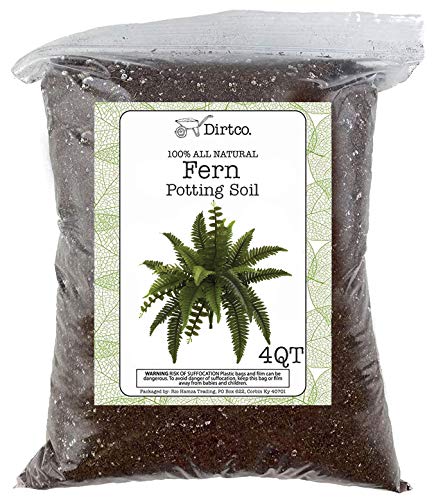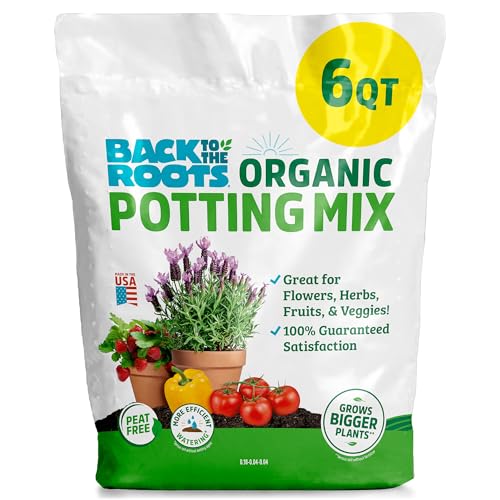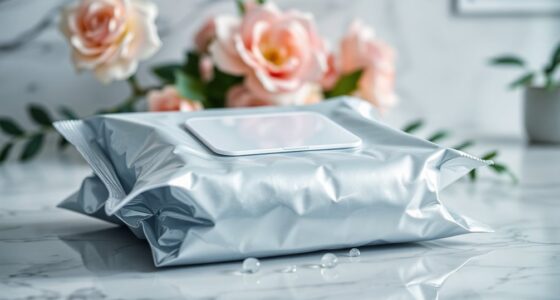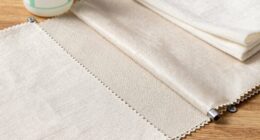I've put together a list of the 15 best soils for Boston ferns to help your plants thrive beautifully. Look for potting mixes that combine peat moss, perlite, and pine bark, as they enhance aeration and moisture retention. I recommend options like the Premium Organic Tropical Plants Potting Soil and Fern Plant Potting Soil Mix for their nutrient-rich content and excellent drainage properties. Always check for a slightly acidic pH level, ideally between 5.5 and 6.5. With the right soil, you can achieve lush growth. Keep exploring for tips on selecting and caring for your Boston fern's perfect environment!
Key Takeaways
- Boston ferns thrive in slightly acidic soil (pH 5.5 – 6.5) for optimal growth and nutrient uptake.
- Moisture retention is crucial; use potting mixes containing peat moss and coconut coir for best results.
- Incorporate perlite or vermiculite in soil to ensure excellent drainage and prevent root rot.
- Organic potting mixes with mycorrhizae enhance nutrient delivery and support healthy fern growth.
- Regularly monitor soil moisture levels and adjust fertilization every 60 days for vibrant foliage.
Potting Soil for Ferns (4 Quarts)
If you're looking to nurture your Boston ferns, the Potting Soil for Ferns (4 Quarts) is tailored just for you. I've found this hand-blended soil mixture perfect for both planting and repotting my ferns, whether indoors or outdoors. Its ideal aeration and drainage keep the roots healthy, which is essential for vibrant foliage. Plus, the nutrient-rich composition truly promotes lush growth, making it easy for anyone—whether a seasoned gardener or a beginner—to use. With a convenient 4-quart packaging, it's perfect for various potting projects. I appreciate that it ranks high in customer feedback, boasting 4.5 out of 5 stars. Overall, this soil has greatly enhanced the well-being of my ferns, helping them thrive beautifully in my living space.
Best For: Gardening enthusiasts and beginners looking to nurture indoor and outdoor ferns effectively.
Pros:
- Hand-blended soil mixture ensures optimal aeration and drainage for healthy fern roots.
- Nutrient-rich composition promotes lush foliage and robust growth.
- Convenient 4-quart packaging is suitable for various potting and repotting projects.
Cons:
- Some users reported concerns about drainage effectiveness.
- Mixed feedback regarding the product's price relative to its usability.
- Reports of varying shelf life may affect long-term storage.
Fern Plant Potting Soil Mix (8 Quarts)
The Fern Plant Potting Soil Mix (8 Quarts) is an excellent choice for anyone looking to cultivate Boston ferns and other delicate varieties. Made by Soil Sunrise, this custom blend features peat moss, pine bark mulch, perlite, sand, and horticultural charcoal, ensuring superior drainage and moisture retention. I love that it's hand blended in small batches without artificial ingredients, making it perfect for nurturing ferns like Boston and maidenhair. At 8 quarts, it's enough for a 12-inch pot, giving my plants ample room to thrive. Customer feedback shows high satisfaction, with many noting improved plant health. While some mention the price is a bit higher than larger bags, the quality truly makes it worth it for my ferns.
Best For: This product is best for plant enthusiasts looking to cultivate healthy ferns, including Boston ferns and maidenhair ferns.
Pros:
- Hand blended with natural ingredients, ensuring quality and no artificial additives.
- Provides excellent drainage and moisture retention, promoting healthy fern growth.
- Sufficient quantity (8 quarts) for a 12-inch pot, ideal for nurturing ferns.
Cons:
- Higher price compared to larger bags of soil from other brands.
- Some users have raised concerns about soil density affecting water retention.
- Limited to ferns, not suitable for regular house plants.
Premium Organic Tropical Plants Potting Soil Mix (4 quarts)
For anyone nurturing Boston ferns and other moisture-loving tropical plants, the Premium Organic Tropical Plants Potting Soil Mix is an outstanding choice. This 4-quart mix provides just the right balance of moisture retention, ensuring your plants stay hydrated without wilting. I love that it's nutrient-rich, thanks to biochar and worm castings, which support healthy growth. Plus, the addition of mycorrhizal fungi boosts nutrient uptake and strengthens roots.
With enhanced drainage from perlite, you won't have to worry about waterlogged soil. It's eco-friendly too, being peat-free, which benefits both your plants and the environment. Best of all, this mix is ready to use for both indoor and outdoor containers, making plant care a breeze!
Best For: This potting soil mix is best for plant enthusiasts nurturing moisture-loving tropical plants like Peace Lilies, Boston Ferns, and Calatheas.
Pros:
- Nutrient-rich with biochar and worm castings for robust plant growth.
- Excellent moisture retention while preventing waterlogging, thanks to enhanced drainage with perlite.
- Eco-friendly, peat-free composition supports sustainable gardening practices.
Cons:
- Limited volume of 4 quarts may not be sufficient for larger planting projects.
- Slightly acidic pH may not be suitable for all plant types.
- Availability may vary depending on location and stock levels.
Jobes Plant Food Fertilizer Spikes for Ferns and Palm Plants (30 Count)
Jobes Plant Food Fertilizer Spikes are an excellent choice for anyone looking to boost the health of their Boston ferns. With an NPK ratio of 16-2-6, these spikes deliver essential nutrients directly to the roots, promoting lush, vibrant foliage. I love how easy they are to use—just insert the pre-measured spikes into the soil every 60 days, and there's no worry about over-fertilization. Plus, they minimize waste and mess, making plant care hassle-free. Customers rave about the improvement in their plants' health, with many noting new growth. With a 4.5-star rating from over 4,180 reviews, I can confidently say that these spikes offer great value and performance for both indoor and outdoor use.
Best For: Those looking to enhance the health and growth of their ferns and palm plants with minimal effort and risk of over-fertilization.
Pros:
- Easy to use with pre-measured spikes that eliminate guesswork.
- Promotes vibrant foliage and healthy plant growth through direct nutrient delivery.
- Minimizes mess and waste, making it ideal for indoor and outdoor use.
Cons:
- Delayed results may occur depending on seasonal factors.
- Limited to specific plant types like ferns and palms, which may not suit all gardeners.
- Requires reapplication every 60 days, which may be inconvenient for some users.
Potting Soil Mix for Fern (2qt)
Crafted specifically for ferns, the Potting Soil Mix for Fern (2qt) from Doter stands out as an ideal choice for plant enthusiasts looking to nurture their Boston ferns. Weighing just 12 ounces, this mix is lightweight yet packed with high-quality organic materials and perlite, ensuring excellent moisture retention and drainage. I've found that it mimics the natural forest ground where ferns thrive, promoting robust growth and lush foliage. The long-lasting moisture retention means I don't have to water as frequently, while its permeability prevents waterlogging and root rot. Whether I'm potting ferns or other exotic plants, this specialty blend enhances overall plant health, making it a reliable option for my indoor and outdoor gardens.
Best For: Plant enthusiasts looking to nurture ferns and other exotic plants in indoor or outdoor gardens.
Pros:
- High-quality organic materials and perlite enhance moisture retention and drainage.
- Mimics natural forest ground, promoting robust growth and lush foliage in ferns.
- Long-lasting moisture retention reduces the frequency of watering needed.
Cons:
- May not be suitable for plants that prefer drier soil conditions.
- Limited to specific plant types, primarily ferns and mosses.
- Some users may find the 2qt size insufficient for larger gardening projects.
Miracle-Gro Houseplant Potting Mix (4 qt.)
Miracle-Gro Houseplant Potting Mix (4 qt.) stands out as an ideal choice for those nurturing Boston ferns due to its balanced composition of perlite and sphagnum peat moss. This mix not only provides excellent drainage but also retains moisture, which is essential for ferns that thrive in humid environments. With its fertilized formula, it feeds plants for up to six months, ensuring your ferns get the nutrients they need to flourish. I've found that its quality is consistent, as it's certified by the Mulch & Soil Council. Plus, it's less prone to gnats, promoting a healthier plant ecosystem. Overall, I highly recommend this potting mix for anyone looking to keep their Boston ferns vibrant and thriving!
Best For: Miracle-Gro Houseplant Potting Mix is best for indoor gardeners looking to support the growth of popular houseplants like Pothos, Spider Plants, and Boston ferns.
Pros:
- Excellent drainage and moisture retention, ideal for plants that thrive in humid conditions.
- Fertilized formula feeds plants for up to 6 months, providing essential nutrients.
- Certified by the Mulch & Soil Council, ensuring high-quality and reliable performance.
Cons:
- Some users may find the mix could benefit from additional perlite for specific plant types.
- While less prone to gnats, occasional pests may still appear in certain environments.
- Limited to indoor use, which may not suit those looking for outdoor potting solutions.
Fern Fertilizer for All Ferns and Mosses, Liquid Plant Food 8 oz (250mL)
If you're looking to boost the health of your Boston ferns, the Fern Fertilizer for All Ferns and Mosses is an excellent choice. With an 8 oz (250mL) liquid formula, I found it incredibly effective, yielding visible improvements in color and overall health within just a month. After applying it, I noticed new growth sprouting within three days, which was exciting! Many users, including those with multiple ferns, report similar satisfaction, especially for hanging varieties. I recommend applying it during the summer months for the best results, either directly to the soil or as a foliar spray. Just a quick heads-up: make sure the bottle is properly sealed to avoid any leakage issues during use!
Best For: Those looking to enhance the health and growth of their ferns and mosses, particularly Boston ferns and hanging varieties.
Pros:
- Visible improvement in fern health and color within a month of use.
- New growth observed just three days after application.
- Versatile application methods: can be used directly in soil or as a foliar spray.
Cons:
- Some users reported leakage due to improper sealing of the bottle.
- Importance of secure packaging noted, which may affect user experience.
- Best results are suggested for summer months, limiting use seasonally.
Craft Aroid Potting Mix for Indoor Plants (1QT)
For anyone looking to create an ideal environment for Boston ferns and other tropical plants, the Craft Aroid Potting Mix is a top choice. This premium blend is packed with beneficial microbes and organic matter, promoting healthy root development. I love that it's peat-free and perlite-free, using eco-friendly pumice and lava rock for excellent drainage. Plus, the addition of New Zealand Tree Fern Fiber helps maintain a neutral pH, mimicking tropical soil conditions. It's ready to use right out of the bag, making it perfect for both novice and experienced plant lovers. I've noticed significant improvements in my plants' growth and overall health, especially when paired with Grow Queen Organic All-Purpose Plant Food.
Best For: This potting mix is best for tropical plant enthusiasts looking for a nutrient-rich, eco-friendly growing medium that promotes optimal plant health.
Pros:
- Excellent drainage and aeration due to the inclusion of pumice and lava rock.
- Ready-to-use, pre-mixed formula saves time and effort for both novice and experienced gardeners.
- Pet-friendly and non-toxic, creating a safe environment for homes with animals.
Cons:
- Limited to indoor tropical plants, may not be suitable for all plant types.
- Smaller 1QT size may require multiple bags for larger repotting jobs.
- Users may need to supplement with additional fertilizers for optimal growth results.
Back to the Roots 100% Organic Potting Mix (6 Quart)
Back to the Roots 100% Organic Potting Mix (6 Quart) is an excellent choice for anyone looking to nurture Boston ferns, thanks to its unique blend of mycorrhizae and coconut coir that enhances water and nutrient uptake. This premium, peat-free mix promotes healthy growth while reducing CO2 emissions. I love how the dolomitic limestone balances pH, preventing nutrient deficiencies. Its light, airy texture guarantees excellent aeration and moisture retention, making it perfect for repotting or starting new plants. Plus, the resealable bag is super convenient for storage. I've noticed my ferns thriving with vibrant growth and improved health. Just be mindful of moisture management to avoid gnats, but overall, this potting mix delivers fantastic results for my Boston ferns!
Best For: Gardeners seeking a high-quality, organic potting mix for nurturing a variety of plants, including Boston ferns, flowers, succulents, and vegetables.
Pros:
- Promotes healthy growth with a unique blend of mycorrhizae and coconut coir for enhanced water and nutrient uptake.
- 100% peat-free, contributing to environmental sustainability by reducing CO2 emissions.
- Resealable bag allows for convenient storage and easy access.
Cons:
- Some users may experience harmless mushrooms due to the presence of organic materials.
- Occasional gnat issues reported, likely related to moisture management.
- May require careful monitoring of moisture levels to avoid overwatering.
Miracle-Gro Potting Mix 8 qt., 2-Pack
Miracle-Gro Potting Mix 8 qt., 2-Pack stands out as an ideal choice for those looking to cultivate lush, thriving Boston ferns. This mix not only feeds your plants for up to six months but also promotes growth that's twice as big compared to unfed plants. I love how its rich, airy texture enhances root development and improves moisture retention, which is essential for ferns. Users rave about the vibrant results, with many noting increased blooms and overall health. However, I've heard some feedback about gnats, so it's wise to keep an eye on that. With a stellar rating of 4.7 stars and a solid reputation, this potting mix is definitely worth considering for your ferns!
Best For: Miracle-Gro Potting Mix 8 qt., 2-Pack is best for indoor and outdoor gardeners looking to achieve vibrant, healthy plants with enhanced growth and bloom frequency.
Pros:
- Feeds plants for up to 6 months, promoting sustained growth and vitality.
- Rich, airy texture enhances root development and improves moisture retention.
- Highly rated by users for effectiveness, resulting in strong and vibrant plants.
Cons:
- Some users have reported issues with gnats in the soil.
- May not be suitable for all plant types, depending on specific needs.
- Packaging size may be insufficient for larger gardening projects.
GARDENERA Premium New Zealand Tree Fern Growing Medium (2 Quart Bag)
The GARDENERA Premium New Zealand Tree Fern Growing Medium is an exceptional choice for anyone passionate about cultivating Boston ferns and other epiphytic plants. Sourced from New Zealand, this medium features a soft, porous texture that guarantees excellent moisture retention while preventing oversaturation. I love that it reduces the frequency of watering, allowing my plants to thrive with minimal effort. With a 4.4-star rating from over 3,400 customers, it's clear that many appreciate its quality. While some find it a bit pricey for the 2-quart bag, I believe the benefits outweigh the cost. Plus, its versatility means I can mix it with other soils to optimize growth for various plant types.
Best For: Orchid enthusiasts and gardeners looking for a high-quality growing medium that promotes healthy plant growth and reduces watering frequency.
Pros:
- Retains moisture effectively, ensuring plants have access to nutrients without the risk of oversaturation.
- Made from sustainably sourced New Zealand tree fern, providing a natural and organic growing environment.
- Highly rated by customers, indicating satisfaction with plant health and overall quality.
Cons:
- Some users find the price to be high for the 2-quart bag compared to other options.
- May require mixing with other soils for optimal results with certain plant types.
- Limited quantity might not be sufficient for larger gardening projects.
Potting Soil Mix – 3QT Organic Soil for Indoor Plants
For anyone looking to nurture Boston ferns, the 3QT Organic Soil Mix stands out as an excellent choice. This premium blend features 55% coconut coir fiber and 12% peat moss, ensuring your ferns have a rich, organic environment. The addition of perlite and vermiculite enhances aeration and drainage, protecting roots from waterlogging and rot. Plus, this mix retains moisture well, which means less frequent watering—perfect for busy plant parents like me.
Lightweight and versatile, it's suitable for various indoor and outdoor plants, making it a fantastic option for any gardener. With an average rating of 4.0 stars from customers, it's clear that this soil mix delivers on quality and performance. Give it a try; your Boston ferns will thrive!
Best For: This potting soil mix is best for indoor gardeners looking to provide a nourishing environment for a variety of plants, including Boston ferns, succulents, and herbs.
Pros:
- Organic composition: Made from natural ingredients like coconut coir and peat moss, promoting healthy plant growth.
- Excellent aeration and drainage: The inclusion of perlite and vermiculite prevents waterlogging, supporting root health.
- Moisture retention: Reduces the frequency of watering, ideal for busy plant owners.
Cons:
- Packaging concerns: Some customers have reported issues with packaging during delivery.
- Limited outdoor use: While versatile, it may not be suitable for all outdoor climates or conditions.
- Weight may vary: Although lightweight, the weight could still be a consideration for larger gardening projects.
Burpee Premium Organic Potting Soil Mix (9 Quarts)
Burpee Premium Organic Potting Soil Mix (9 Quarts) stands out as an excellent choice for anyone looking to provide their Boston ferns with the ideal growing environment. This all-natural mix combines plant food with coconut coir, ensuring your ferns get the nutrients they need. With essential nutrients released immediately and a slow-release plant food lasting up to three months, you won't have to worry about frequent feedings. It retains moisture well, which is perfect for ferns that thrive in humid conditions. Users rave about its excellent drainage and healthy plant growth, earning it a solid 4.6 out of 5 stars. Plus, Burpee backs it up with a satisfaction guarantee, making this potting mix a reliable option for your plants.
Best For: Burpee Premium Organic Potting Soil Mix is best for indoor and outdoor gardeners looking for a high-quality, nutrient-rich soil for their potted plants, especially ferns.
Pros:
- Excellent moisture retention due to coconut coir, ideal for humidity-loving plants.
- Immediate nutrient release and slow-release plant food for up to three months, reducing the need for frequent feeding.
- High customer satisfaction with a rating of 4.6 out of 5 stars, indicating consistent quality and performance.
Cons:
- Some users find the product to be slightly overpriced compared to alternatives.
- A few customers have suggested that the bag closure design could be improved for easier storage.
- Limited to container or raised bed planting, may not suit all gardening needs.
Potting Soil Mix for Hoya (1qt)
Looking for a reliable potting soil mix that supports Hoya plant growth? I've found the Potting Soil Mix for Hoya (1qt) by Doter to be a solid choice. This specialized mix promotes ideal growth with its nutrient-rich formula, ensuring healthy foliage and blooms. Plus, its excellent drainage prevents waterlogging and root rot, which is essential for keeping your plants thriving.
At 7.9 ounces, it's easy to handle and ready to use right out of the bag. While it has a customer rating of 3.4 stars, many users rave about the vibrant growth they've experienced. Just be mindful of potential pest concerns, but overall, it's worth considering if you're serious about your Hoya plants!
Best For: This potting soil mix is best for dedicated Hoya plant enthusiasts seeking optimal growth support and vibrant foliage.
Pros:
- Nutrient-rich formula enhances healthy growth and blooming.
- Excellent drainage prevents waterlogging and root rot.
- Convenient, ready-to-use mix simplifies potting and repotting.
Cons:
- Customer rating of 3.4 stars indicates mixed user experiences.
- Some users reported concerns about potential pest issues.
- Higher pricing compared to other soil options may deter budget-conscious buyers.
Indoor Potting Soil for House Plants – Organic Potting Soil Mix (4qt)
Choosing the right soil mix can make all the difference in nurturing your Boston ferns. I've found that the Indoor Potting Soil for House Plants—an organic, peat-free blend—works wonders. Enriched with biochar and pine bark fines, this 4-quart mix promotes robust root systems and balances moisture retention, which is essential for ferns. Plus, it's fortified with beneficial fungi and microbes that support healthy root development.
When using it, I fill a well-draining container and gently free the roots from any debris before transferring my plants. A generous watering guarantees everything settles nicely. I also appreciate that it comes in a resealable, plastic-neutral bag, making it both eco-friendly and convenient. With a 4.4-star rating, it's a favorite among indoor gardeners!
Best For: Indoor gardeners looking for an organic, peat-free soil mix that promotes healthy root development in houseplants, especially ferns and foliage plants.
Pros:
- Enriched with biochar and beneficial microbes for optimal root growth and moisture retention.
- Eco-friendly packaging that is resealable and made from sustainable materials.
- High customer satisfaction with a 4.4-star rating, indicating effectiveness for various indoor plants.
Cons:
- Some customers have reported variations in texture and ingredients with the new packaging.
- The 4-quart size may not be sufficient for larger planting projects or extensive indoor gardens.
- Limited availability compared to other garden soil options on the market.
Factors to Consider When Choosing Soil for Boston Fern

When I choose soil for my Boston ferns, I always think about several key factors. Drainage and aeration are essential, but I also want a nutrient-rich mix that retains moisture without becoming soggy. Plus, considering the pH level and suitable ingredients can really make a difference in their growth.
Drainage and Aeration Needs
Selecting the right soil for Boston ferns hinges on understanding their unique drainage and aeration needs. These plants thrive in well-draining soil to prevent waterlogging, which can lead to root rot and other health issues. I've found that adding perlite or vermiculite to the mix greatly enhances aeration, allowing oxygen to flow freely to the roots. This is essential for their healthy growth.
When I create my soil mix, I always aim for a lightweight potting medium that includes organic matter like peat moss or coconut coir. This combination retains moisture while guaranteeing adequate drainage. It's a balancing act, but it's fundamental because Boston ferns do best in consistently moist, but not soggy, conditions.
I also pay attention to the pH level, aiming for slightly acidic soil between 5.5 and 6.5. This helps optimize nutrient availability, which is critical for my ferns. Regularly monitoring moisture levels guarantees I keep their environment just right. By focusing on these drainage and aeration needs, I've seen my Boston ferns flourish beautifully.
Nutrient-Rich Composition
After ensuring proper drainage and aeration, the next step is ensuring the soil provides a nutrient-rich composition that supports the vibrant growth of Boston ferns. These plants thrive when they receive essential minerals and nutrients, so I always look for soil enriched with organic materials like worm castings and biochar. These additions greatly boost nutrient availability and promote healthier root systems.
I also pay attention to the pH balance of the potting soil. A slightly acidic pH is ideal, as it enhances nutrient absorption, helping my ferns flourish whether they're indoors or outdoors. Additionally, I incorporate ingredients like peat moss and perlite. They improve aeration and moisture retention, allowing the fern roots to access nutrients without the risk of waterlogging.
Creating a well-blended soil mix that mimics the natural forest floor is vital. This approach replicates the environment where Boston ferns naturally grow, ensuring suitable nutrient uptake and overall plant health. By focusing on these nutrient-rich components, I've seen my Boston ferns thrive, boasting robust growth and lush foliage that truly brings life to my space.
Moisture Retention Properties
To guarantee my Boston ferns thrive, I prioritize soil with excellent moisture retention properties. These ferns love consistently moist environments, so I make sure their soil can hold water without becoming waterlogged. I often choose potting mixes that include coconut coir or peat moss, as they greatly enhance moisture retention. This combination keeps the soil damp, which is vital for my ferns' growth.
I also like to incorporate perlite into my soil blends. It improves aeration while still supporting adequate moisture retention, which is essential for preventing root rot. Regularly monitoring soil moisture levels helps me maintain the right balance; my Boston ferns prefer their soil to be damp but not soggy.
Additionally, I enrich the soil with organic materials like worm castings or biochar. These not only boost moisture retention but also enhance nutrient availability, making sure my ferns get the best care possible. By focusing on these moisture retention properties, I create an ideal environment for my Boston ferns to flourish, keeping them lush and vibrant throughout the year.
Ph Level Considerations
When it comes to nurturing my Boston ferns, I pay close attention to the pH level of the soil, as these plants thrive in slightly acidic conditions with a pH between 5.5 and 6.5. Maintaining this range is essential; if the soil becomes too alkaline, my ferns can suffer from nutrient deficiencies and overall poor health.
I make it a habit to regularly test the soil pH, which allows me to adjust the soil composition as needed. If the pH is too high, I can use amendments like sulfur to lower it, or lime to raise it if necessary. I also find that incorporating organic matter, such as compost or peat moss, not only helps lower the soil pH naturally but also enhances moisture retention and nutrient content.
It's important to note that factors like water quality and certain fertilizers can influence soil pH. Consequently, I keep an eye on these elements to guarantee my Boston ferns enjoy the ideal conditions for growth. By being proactive about pH levels, I set my plants up for thriving health and beauty.
Suitable Ingredients for Growth
Choosing the right soil mix for my Boston ferns is vital to their health and vigor, as the right ingredients can greatly impact their growth. I've found that a potting mix rich in organic materials like peat moss and pine bark is essential. These ingredients help retain moisture while providing the aeration needed for healthy root development.
It's also important to guarantee the soil drains well. I like to include perlite or vermiculite to prevent waterlogging, which can lead to root rot. To further enhance the soil, I add horticultural charcoal; it improves soil structure and helps maintain the slightly acidic pH that Boston ferns thrive in, ideally between 5.0 and 6.0.
Additionally, I've discovered that soil mixes enriched with mycorrhizal fungi support nutrient uptake and bolster the ferns' resilience against stressors. This combination of ingredients guarantees my Boston ferns have the best environment to flourish. By focusing on these suitable ingredients, I can create a thriving habitat for my ferns, ultimately leading to lush, healthy growth.
Frequently Asked Questions
How Often Should I Repot My Boston Fern?
I usually repot my Boston fern every 1 to 2 years, depending on its growth. If I notice roots poking out of the drainage holes or the plant seems cramped, it's time for a change. I like to choose a pot that's a bit larger and refresh the soil to give my fern a healthy boost. Keeping an eye on its growth helps me know when it's time to repot.
Can I Use Garden Soil for My Boston Fern?
Using garden soil for my Boston fern feels tempting, but it can lead to trouble. While garden soil provides nutrients, it often lacks the drainage and aeration my fern needs. I've learned that a specialized potting mix works best, ensuring my fern thrives without the risk of root rot. So, if you're considering garden soil, I'd advise against it. Trust me, your fern will thank you for the right choice!
What Ph Level Is Ideal for Boston Fern Soil?
I've found that Boston ferns thrive best in soil with a pH level between 5.0 and 6.0. This slightly acidic range helps them absorb nutrients more effectively. If you're unsure about your soil's pH, you can easily test it with a kit from a garden center. Keeping the right pH not only supports healthy growth but also helps prevent issues like root rot, which I always try to avoid with my ferns.
Should I Add Perlite or Vermiculite to the Mix?
When it comes to potting soil, think of it as a cozy blanket for your plants. I'd definitely recommend adding perlite or vermiculite to your mix. Perlite improves drainage and aeration, while vermiculite retains moisture and nutrients. I usually go with a combination of both, creating a comfy, breathable environment for my plants. Trust me, they'll thrive in this mix, and you'll be rewarded with lush greenery in no time!
How Do I Know if My Fern Needs More Moisture?
I usually check my fern's leaves for signs of moisture needs. If they start curling or turning brown, it's a clear indicator it needs more water. I also touch the soil—if it feels dry an inch below the surface, it's time to give it a drink. Keeping an eye on humidity levels in my home helps too; if it feels dry, I mist the fern to boost moisture.
Conclusion
So, there you have it—15 fantastic soils to pamper your Boston ferns. I mean, who knew these delicate beauties needed more care than a high-maintenance celebrity? But hey, if you want your ferns to thrive like they're auditioning for a botanical reality show, go ahead and splurge on the right mix. Just remember, while your ferns bask in their luxurious soil, you might want to contemplate a cozy spot for yourself—because nurturing plants is exhausting work!

























